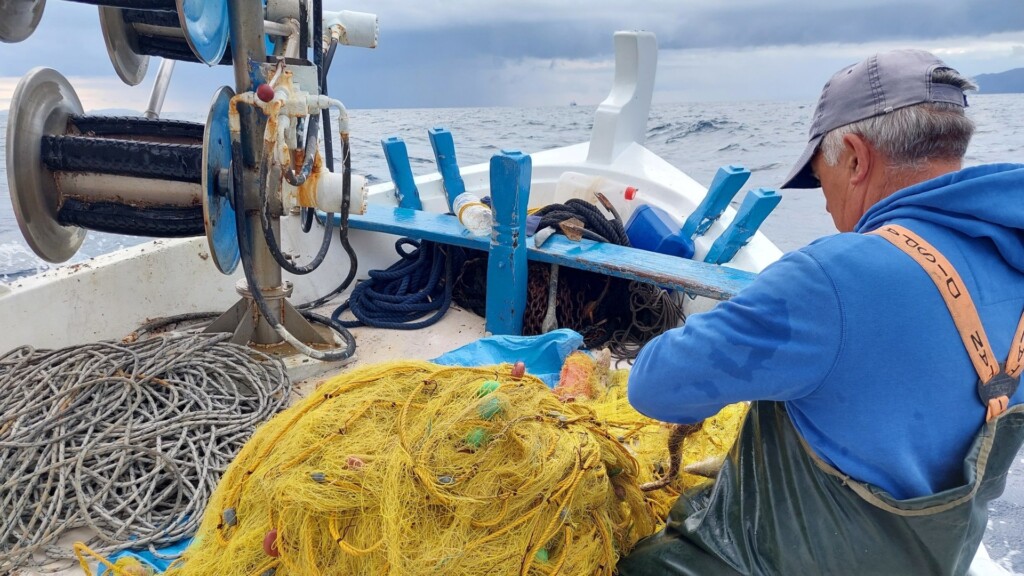A crucial milestone in mitigating human-wildlife conflict at sea

For almost two decades, several Together for the Med partners, led by WWF Greece, have worked tirelessly to reduce the negative impacts stemming from interactions between marine protected species and fisheries. These conflicts harm both fishers—who face gear damage and loss of catches—and marine megafauna, which are threatened by injury or death from accidental entanglement. Thanks to collaborative efforts and thorough scientific research, a significant breakthrough has been made: small-scale fishers in Greece can receive financial assistance to help support fishers from financial losses caused by marine wildlife. This crucial progress was achieved in the wake of the Together for the Med InCa project.
A long-standing challenge for marine life and small-scale fisheries
Greek waters are home to many threatened and protected species—cetaceans, Mediterranean monk seals, sea turtles, seabirds, sharks, and rays—and they also serve as key fishing grounds. Because fishers and marine megafauna compete for the same resources, their interactions often result in:
- Risk for marine megafauna: injury or death from incidental entanglement in fishing gear.
- Economic challenges for fishers: gear damage and lost catches when these species try to feed.
Over the years, fishers’ frustration has grown as the frequency of such incidents increase, partly due to rising populations of certain protected species.
Milestone: financial assistance for small-scale coastal fishers
In November 2024, the Ministry of Agriculture and Rural Development and Food introduced a Ministerial Decision (M.D. 2004/2024, Gov’t Gazette Issue B’ 6312/15.11.2024) and a call for applications for financial assistance targeting small-scale fishers. By leveraging the European Maritime, Fisheries and Aquaculture Fund, the Greek government seeks to partially cover the economic damage caused by gear destruction and catch losses. This support is a vital step toward balancing fishers’ needs and safeguarding marine biodiversity.
Two decades of dedicated efforts led by WWF Greece and others Together for the Med partners
Early steps (2005–2009)
First survey on interactions: In 2005, MOm (the Hellenic Society for the Study and Protection of the Monk Seal) coordinated a survey on marine mammal and fisheries interactions in selected areas nationally, in collaboration with the Fisheries Research Institute and WWF Greece.
Conflict mitigation proposals: By 2009, those involved developed -for the first time- clear recommendations to lessen the negative impacts on both small-scale fisheries and marine mammals.
Developments (2019–2022)
Updated mitigation measures: In 2019, WWF Greece refined its conflict-reduction proposals, emphasizing on key strategies to support fishers capacity to overcome income lost due to marine mammal interactions and submitted them to the relevant national authorities.
National-level data collection (InCa project): Recognizing the necessity for comprehensive scientific data, WWF Greece led a nationwide study in 2020. Collaborating with the Laboratory of Ichthyology of the Aristotle University of Thessaloniki and the Institute of Marine Biological Resources and Inland Waters of the Hellenic Centre for Marine Research (HCMR), crucial evidence on financial losses related to marine megafauna as well as the magnitude of incidental catch was collected. This research was carried out under the InCa project, within the partnership Together for the Med.
Concrete policy recommendations: In 2022, based on the InCa project results, the project partners unveiled specific proposals to address the issue—these included the development of a financial support system for small-scale fishers, to compensate them for income losses caused by marine megafauna.
Recent achievements (2023–today)
Advocacy through the ‘Greek Wildlife Alliance’: Building on the findings from the InCa project, the partners lobbied for a nationwide compensation framework for small-scale fishers. This effort directly contributed to the Ministerial Decision introducing the current financial assistance program.
Why this financial measure matters
Offering financial support acknowledges the significance of small-scale fisheries in Greece’s island and coastal communities. At the same time, it emphasizes the importance of preserving marine ecosystems by compensating fishers for losses caused by protected species. Still, while this measure marks a major advancement, it must be complemented by:
- Management and technical actions: adapting and developing new fishing methods and gear modifications to cut down on harmful interactions.
- Systematic monitoring: continuous data collection to monitor and analyze marine wildlife interactions.
- Long-term funding: leveraging both European and national resources to secure the implementation of comprehensive and viable solutions.
Next steps
Moving forward, the Ministry and all stakeholders should collaborate on a strategic plan that includes preventive measures, robust research, and secured funding. By aligning fishers’ economic needs with biodiversity conservation goals, Greece can lead the way toward sustainable coexistence between humans and marine wildlife.
Establishing this financial support program is a significant leap forward in conserving marine biodiversity and ensuring the well-being of small-scale fishers. Sustained collaboration and evidence-based policies will enable a future in which communities and marine ecosystems flourish in harmony.



